-
Daniel???A Model Leader In Tough Times
by Dr. J. Robert Clinton??
This 171 page commentary (PDF file) is one of a series of Biblical leadership commentaries. This series explores the most relevant books of the Bible for leadership findings. The leadership commentary on Daniel involves an overview of the Daniel, i.e. a recognition of the contribution of this book to the whole Bible. It then follows with the identification of 12 important leadership topics/lessons. Then there is the actual leadership comments on the text.?? Finally there are 33 leadership articles totaling 100 pages describing various aspects of leadership seen in Daniel.?? A 14 page Glossary of leadership terms follows the leadership articles. Daniel is one of only a handful of leaders in the Bible who finished well. See especially his response to deep processing. See also his power ministry and insights about spiritual warfare.??(Revised 2006)
-
John???Jesus??? Incarnational Leadership
by Dr. J. Robert Clinton
This 349 page commentary (PDF file) is one of a series of Biblical leadership commentaries. This series explores the most relevant books of the Bible for leadership findings. The leadership commentary on John involves an overview of John, i.e. a recognition of the contribution of this book to the whole Bible. It then follows with the identification of 17 important leadership topics/lessons. Then there is the actual leadership comments on the text. ??Finally there are 66 leadership articles totaling 230 pages describing various aspects of leadership seen in John. A 25 page Glossary of leadership terms follows the leadership articles. ??John, more than any of the three synoptic Gospels, presents Jesus??? incarnational leadership. He was sent from the Father. See the Article, Jesus???Sentness. Sentness is a term capturing the divine backing of Jesus??? intervention in the world to represent and reveal God to our world. It carries the notion of anointing and appointment by God for a mission, but in Jesus??? case???more since it was the incarnation of God in human form. ??John presents Jesus as the Eternal God who became a human being, revealed the Father and His love, and offered eternal life (salvation) to whoever trusts Him.?? (Revised spring 2008)
-
1, 2 Samuel Commentary
Comparative Study of Leaders in an Emerging Kingdom???The Major Leaders in 1,2 Sa: Hannah, Eli, Samuel, Saul, Jonathan, Abner, David, Abigail, Joab, Absalom, Ahithophel, Hushai, Nathan.
by Dr. J. Robert Clinton
This 630 page commentary (PDF file) is one of a series of Biblical leadership commentaries. This series explores the most relevant books of the Bible for leadership findings. The leadership commentary on 1,2 Samuel involves an overview of 1.2 Samuel, i.e. a recognition of the contribution of 1.2 Samuel to the whole Bible. It then follows with the identification of 15 important leadership topics/lessons. Then there is the actual leadership comments on the 13 leaders??? vignettes or Bible Units??? Hannah (2 Vignettes), Eli (8 Vignettes), Samuel (19 Vignettes), Saul (23 Vignettes), Jonathan (10 Vignettes), ??Abner (13 Bible Units), David (22 Vignettes), ??Abigail (12 Bible Units), ??Joab (12 Vignettes), Absalom (12 Vignettes), ??Ahithophel (10 Bible Units), ??Hushai (7 Bible Units), and Nathan (18 Bible Units). ?? Finally there are 85 leadership articles totaling 447 pages describing various aspects of leadership seen in each of the 13 leaders. ??Included in these 85 leadership articles is a biographical sketch article for each of the 13 leaders listed in the title. ??A 22 page Glossary of leadership terms follows the leadership articles.
-
Obadiah – God: The Promise Keeper
by Dr. J. Robert Clinton and Kenichi Yoshida
Individual Commentary (pdf file). The message of Obadiah is an example of God???s meting of justice to nations who violently take revenge on others. Obadiah can inspire us to believe that God is The Promise Keeper (the good ones and the bad ones).
-
Philemon Commentary
by Dr. J. Robert Clinton
Individual Commentary (pdf file). This book shows the power of the Gospel to transform lives and to transform society. It was written in the same time span as the epistle to the Ephesians and the epistle to the Colossians. Those lofty epistles, with great doctrinal truth, were companion letters being carried to churches in the same area.
-
1, 2 Corinthians – Problematic Apostolic Leadership
by Dr. J. Robert Clinton
This 411 page book (pdf file) is one of a series of Biblical leadership commentaries. This series explores the most relevant books of the Bible for leadership findings. The leadership commentary on 1,2 Corinthians involves an overview of the books of 1,2 Corinthians, i.e. a recognition of the contribution of these two books as a whole to the Bible.
-
Titus – Apostolic Leadership
by Dr. J. Robert Clinton
Individual Commentary (pdf file). This book introduces a taxonomy of Apostolic ministries: Paul???Stage 1, Timothy???Stage 2, and Titus???Stage 3. Apostolic gift-mixes are explored for all three stages of apostolic ministry. Contextualization of Christian teaching into the situation in Crete is explored.
All Products
-
1, 2 Samuel Commentary
$15.00Philemon Commentary
$10.00Titus – Apostolic Leadership
$10.00 -
1, 2 Timothy Commentary
$10.00Nehemiah – Focused Living
$10.00
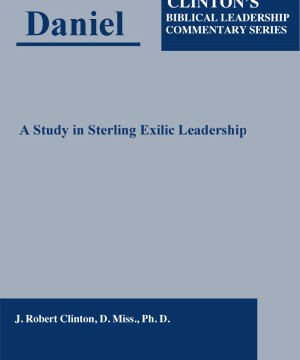
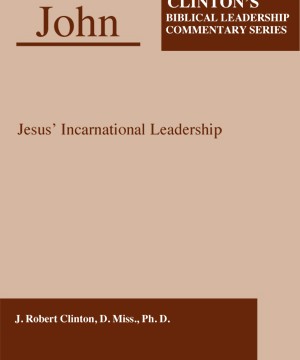
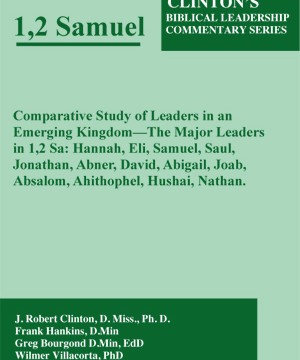
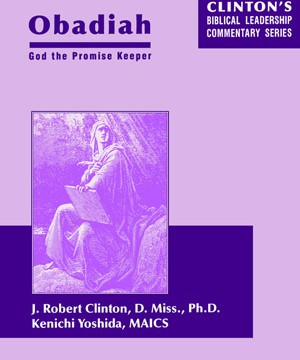
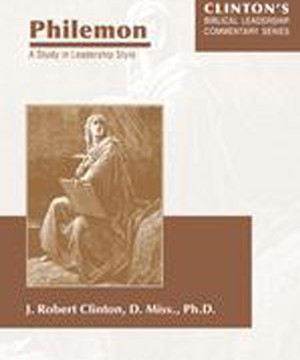
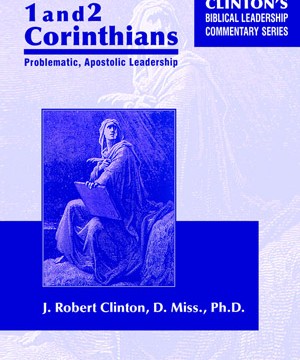
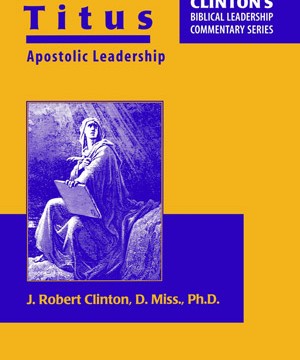
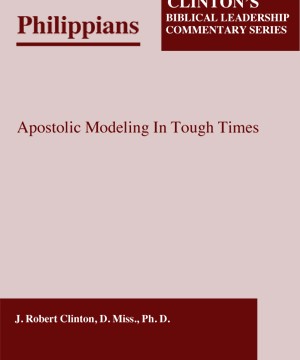
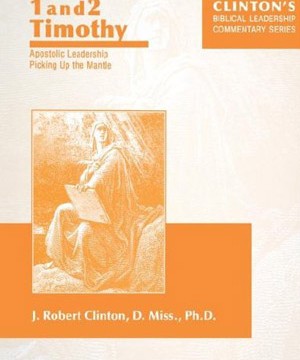
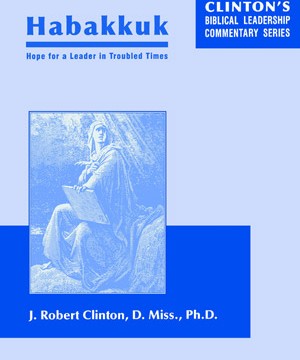
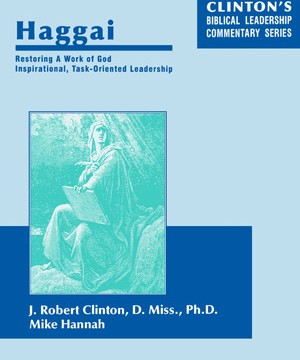
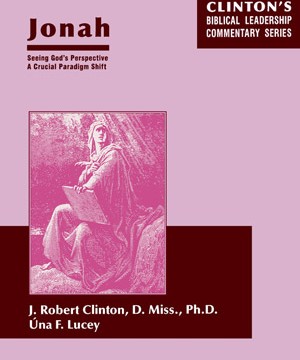
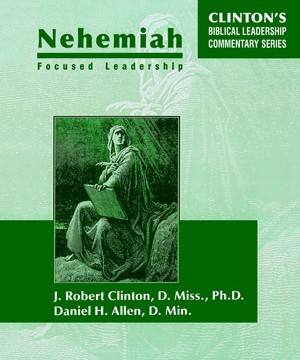
Philippians???Apostolic Modeling in Tough Times
by Dr. J. Robert Clinton ??
This 198 page commentary (PDF file) is one of a series of Biblical leadership commentaries. This series explores the most relevant books of the Bible for leadership findings. The leadership commentary on Philippians involves an overview of Philippians, i.e. a recognition of the contribution of this book to the whole Bible. It then follows with the identification of 8 important leadership topics/lessons. Then there is the actual leadership comments on the text.?? Finally there are 38 leadership articles totaling 146 pages describing various aspects of leadership seen in Philippians. A 9 page Glossary of leadership terms follows the leadership articles. ??Philippians is Paul???s most powerful modeling book. He explicitly espouses modeling (see Php 4:7). In this book Paul models how a Christian lives joyfully even in deep processing. He demonstrates a sovereign mindset in his prison experience.??(Revised 2006)